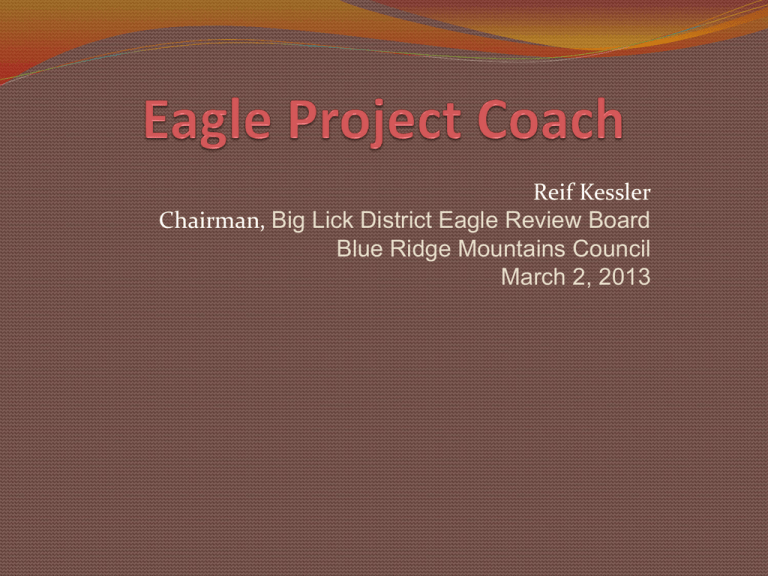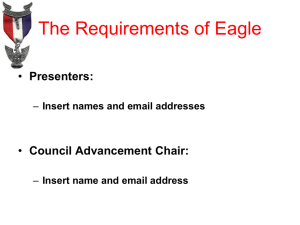HERE - Blue Ridge Mountains Council
advertisement

Reif Kessler Chairman, Big Lick District Eagle Review Board Blue Ridge Mountains Council March 2, 2013 By the end of today’s session Understand the nature of an Eagle Scout Service Project Understand the role of the Eagle Project Coach Understand the process by which Eagle Service Projects are approved Be able to evaluate the appropriateness of projects What is the purpose of the Eagle Scout Service Project? Service Leadership Learning Appropriate challenge Organizational Experience Acceptance of Responsibility Planning Stretch Growth Key Learning “As an adult, you may not remember the particular experience or challenge of any merit badge,… … but you will never forget your Eagle Service Project.” Adult Eagle Scout The Eagle Project Coach The Eagle Service Project will be challenging. The Scout will need an adult to coach and encourage him through the process. The Scoutmaster (SM) appoints an Eagle Project Coach (EPC), who has completed Eagle Coach Training. If you do not have sufficient experience ask the District Advancement Committee (DAC) for help. The Eagle Project Coach (EPC)… Is a role, not a position Is an adult –registered and preferably with basic training – associated with the unit Is often the Scoutmaster, but need not be Could be a member of the District Advancement Committee or District Eagle Review Board Is not self-appointed Should not be the parent of the Eagle candidate Should complete Eagle Project Coach Training The Responsibilities of the Eagle Project Coach. . . Primary coach for the Scout throughout the Service project Ensures that the project meets BSA’s requirements Ensures that the project offers leadership and growth potential for the Scout Encourages the Scout to do thorough and careful planning Informs appropriate individuals if there are any special circumstances of which the District Advancement Committee (DAC) should be aware when evaluating the appropriateness of this project? The Process Phase I - Project Concept Approval Phase II - Project Planning Phase III - Executing the Project Plan Criteria for an Eagle Scout Service Project Significant contribution of benefit to the community Sufficient magnitude to be special and challenging Must require the Eagle Scout candidate to demonstrate significant leadership Must be realistically achievable Restrictions Cannot involve council property or any other BSA activity; the Boy Scouts cannot be the beneficiary in any way. Cannot be shared with any other Eagle candidate. Cannot be routine labor or service normally rendered. Cannot be performed for a business or an individual (with some exceptions) Examples Raised gardening beds for senior housing facility. Community or church playground upgrades. Outdoor meeting areas, patios, picnic areas, amphitheaters, meditation gardens. Nature trails, public access trails, stairs. Storage facilities for churches, schools, community service facilities. Restrictions Cannot be of commercial nature. Cannot be a fundraiser. (But fundraising is a part of most projects.) Cannot be a solo project. The Eagle Candidate must lead a group of people, most of whom should ideally be youth. (Projects executed by the Eagle Candidate alone do not qualify.) Fundraising Car washes. Spaghetti dinners. Yard sales. Sponsoring organization funds. Limited donations, family funds, or personal funds. No raffles or games of chance. Fundraising Applications must be submitted and approved. No funds are to be raised until project and fundraising plans are approved. Phase I - Concept Approval The Eagle Candidate develops one or more ideas about possible Eagle Service Projects. He discusses his ideas with the EPC to narrow or prioritize the options. The Eagle Candidate discusses the project with the benefiting organization and secures their approval. He finalizes his idea in sufficient detail for presentation to the DAC (Eagle Review Board) for approval. Phase I - Concept Approval Details required for Concept Approval Project description and beneficiary Leadership – what team is needed, recruiting, Materials, supplies, tools, permits and permissions needed Preliminary cost estimate Project phases and logistics Safety issues Future planning needs Phase I - Project Concept Approval Scout discusses project with benefiting organization Concept approved by EPC No Yes Concept approved by District No Yes Go to Phase II Role of the District Advancement Committee Quality Control Ensures that the project plan complies with the criteria and restrictions of an Eagle Service Project. Ensures that the project is realistically achievable. Shares their experience regarding successful projects. (The more detailed the proposal concept is the better able they are to provide meaningful help.) Role of the EPC Attend meetings between the Scout and the DAC/ERB Let the Scout do the presentation - keep quiet Take notes on comments and concerns of the DAC/ERB Review the requested changes, if any, with the DAC/ERB and the Scout; ensure that there is understanding and agreement What if the District Advancement Committee does not approve the plan? Heed their advice and input – they are experienced. Carefully review their recommendations and address in detail all points of concern. After addressing all points of concern, the Scout and EPC will meet again with the DAC/ERB and review the corrections. What if the District Advancement Committee approves the plan with comments? Heed their advice and input – they are experienced. Carefully review their recommendations and address in detail all points of concern. There is no need for further approval, but proceed with caution. Failure to properly address concerns could result in disapproval upon project review. “Be Prepared” The plan describes how the project will be done and should be written with sufficient and significant detail so that the plan could be given to others to lead the project if the Scout were absent. The project will be performed by a group of youth under the Scout’s direction. Remember that the “doers” presumably know less about the project than the Scout. The Project Details Present Condition Materials/Supplies/Tools Budget/Fund Raisers Project Helpers Schedule/Phases/Logistics Safety Hazards Leadership Contingency Scout Tests His Understanding Review the written proposal with the EPC. Could another youth use the plan to execute the proposed project in the absence of the Scout? Have you checked spelling and grammar? Ask people to read the proposal critically and suggest improvements. Listen to their suggestions. Module 4 – The Process Phase II - Project Planning Scout plans project and discusses project details with benefiting organization EPC coaches Scout Project plan approved by EPC or SM Yes Go to Phase III No Scout revises project plan; EPC coaches Warning: There is no further review by DAC/ERB Summary of Roles The Eagle Candidate is the owner of the Eagle Service Project The Eagle Coach guides, coaches, and encourages the Eagle Candidate through the process. The District Advancement Committe/Eagle Review Board ensures that the project concept and preliminary plan comply with the criteria and restrictions of an Eagle Service Project and that the scope of the project is appropriate for the Scout. Eagle Board of Review A group of Scouters interested in seeing Scouts succeed in achieving the rank of Eagle Scout in a meaningful way. A conversation with the Eagle Candidate, not a “grilling”. Did the Scout undertake the approved project with limited deviations. Was the Scout the leader of the project. Discussion of the Scout’s scouting experience. Discussion of the values of Scouting and their meaning to the Scout. Eagle Court of Honor An individual ceremony honoring only the Eagle Scout. No other ceremony in the life of a young man will be focused on just him. Many in attendance will have never seen an Eagle ceremony. Ceremonial opening – Color Guard, Pledge of Allegiance, Recitation of Scout Oath and Law. Review significance of the Eagle rank and its requirements. Recitation of the Eagle’s scouting career, experience, leadership, and accomplishments. Can have a religious emphasis if desired. Involvement of family members is appropriate. Celebrate! Conclusion Obtaining the rank of Eagle Scout is a significant event. It should not be cheapened by “easy” projects or by the over-involvement of adults. The Scout must be the developer and leader of a significant project. But, a Scout will require careful guidance, and each to a different degree.



